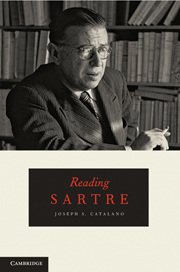Preface
Published online by Cambridge University Press: 05 June 2012
Summary
About forty years ago, I was introduced to Jean-Paul Sartre's thought as a pure accident of a teaching career in philosophy. For reasons that are too complicated to mention here, the late Dean Ruben Abel of the New School for Social Research in Manhattan asked me to teach a series of courses in Existentialism. Neither my undergraduate nor graduate training in philosophy prepared me for the subject matter; but the challenge came at a time in my life when I was looking for a change. I found it. But I did not know at first that I would keep returning to the philosophy of Jean-Paul Sartre, particularly to the four works I consider here, namely, Being and Nothingness, Saint Genet: Actor and Martyr, The Critique of Dialectical Reason, and The Family Idiot. I offer no excuse. These works continue to nourish my own thinking about the world.
One might nevertheless ask whether my personal interest in Sartre justifies another book about his thought. I could answer that these four works give the substance of Sartre's philosophy as it developed from his first essay on the imagination published in 1936 until the appearance of the last volume of The Family Idiot in 1972, and that I do not think many people have had either the leisure or the commitment to study these long and difficult books. Perhaps, then, it is sufficient to say that I simply wish to share the fruits of my labor.
- Type
- Chapter
- Information
- Reading Sartre , pp. ix - xiiPublisher: Cambridge University PressPrint publication year: 2010



